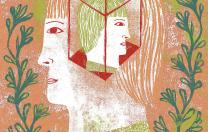Strange Relation: A Memoir of Marriage, Dementia, and Poetry
(Paul Dry Books, 2011)
by Rachel Hadas ’69
Rutgers University English professor Rachel Hadas recounts the medical interview during which her husband of more than 25 years, George Edwards, cannot correctly recall the year they got married.
The feeling was “a little too melodramatic to call panic. It was, rather, a sharply etched loneliness...that stepped out from the shadows to which I had so far consigned it right onto center stage. There was also a queasy sense of shifting: shifting of power, of paradigms, of alliances, of allegiances. The center wasn’t holding, and I was in the process, as I hung on to my clammy water bottle for dear life, of casting about for a new center. In all this there was alarm and fear, but really, as I now recall it, no surprise.”
Making An Exit: A Mother-Daughter Drama with Machine Tools, Alzheimer’s, and Laughter
(Metropolitan Books / Henry Holt and Company, 2005)
by Elinor Fuchs ’55
Yale School of Drama adjunct professor Elinor Fuchs grappled with her mother’s larger-than-life persona and how to love a difficult person. Here she has just spent some time on her mother’s new special-care unit.
“I take Mother out for a stroll around the block, just to clear my head. We walk inside a cloud of confusion. The distinction between sidewalks and parking lots, flowers and grass, people and objects, has vanished....Whether people who pass us on the street are with us, or the ones we’re waiting for, or perhaps against us—all is confusion. Mother flags passing cars as if they should pick us up. As puzzled drivers hesitate between the brake and the accelerator, I try to turn this gesture into merry waving.”
The Last of His Mind: A Year in the Shadow of Alzheimer’s
(Swallow Press / Ohio University Press, 2009)
by John Thorndike ’64
The author took care of his ailing father, Joe Thorndike, also a writer, a publisher, and one-time managing editor of Life.
“Sundowning is the depressed state that often overwhelms the memory-impaired around dusk, and most days my father sinks into it around four or five in the afternoon. He lies on his bed with a vacant stare, unhappy and distant, never a glance my way. This afternoon, when I suggested we go down to Red River Beach, he said, ‘Not now,’ even his politeness drained out of him.”







